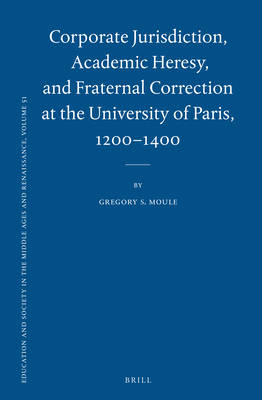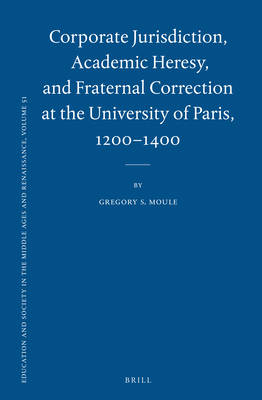
- Afhalen na 1 uur in een winkel met voorraad
- Gratis thuislevering in België vanaf € 30
- Ruim aanbod met 7 miljoen producten
- Afhalen na 1 uur in een winkel met voorraad
- Gratis thuislevering in België vanaf € 30
- Ruim aanbod met 7 miljoen producten
Zoeken
Corporate Jurisdiction, Academic Heresy, and Fraternal Correction at the University of Paris, 1200-1400
Gregory S Moule
€ 290,45
+ 580 punten
Omschrijving
In Corporate Jurisdiction, Academic Heresy, and Fraternal Correction at the University of Paris, 1200-1400, Gregory S. Moule explains how the theological faculty acquired independent jurisdiction over cases of academic heresy among its membership. He convincingly demonstrates that the faculty's jurisdiction and procedures were modelled on the pattern of a bishop and his cathedral canons.
Gregory S. Moule's analysis of Pierre D'Ailly's Apologia confirms the faculty's jurisdiction and establishes that the censures of Denis Foulechat and John of Monteson were instances of judicial rather than fraternal correction. Medieval discussions of Judas Iscariot further clarify fraternal correction's role in the process of censure. Canon law, corporate theory, scholastic theology, and biblical commentary are employed to produce a wide-ranging, original, and thought-provoking study.
Gregory S. Moule's analysis of Pierre D'Ailly's Apologia confirms the faculty's jurisdiction and establishes that the censures of Denis Foulechat and John of Monteson were instances of judicial rather than fraternal correction. Medieval discussions of Judas Iscariot further clarify fraternal correction's role in the process of censure. Canon law, corporate theory, scholastic theology, and biblical commentary are employed to produce a wide-ranging, original, and thought-provoking study.
Specificaties
Betrokkenen
- Auteur(s):
- Uitgeverij:
Inhoud
- Aantal bladzijden:
- 390
- Taal:
- Engels
- Reeks:
- Reeksnummer:
- nr. 51
Eigenschappen
- Productcode (EAN):
- 9789004311329
- Verschijningsdatum:
- 19/05/2016
- Uitvoering:
- Hardcover
- Formaat:
- Genaaid
- Afmetingen:
- 155 mm x 236 mm
- Gewicht:
- 716 g

Alleen bij Standaard Boekhandel
+ 580 punten op je klantenkaart van Standaard Boekhandel
Beoordelingen
We publiceren alleen reviews die voldoen aan de voorwaarden voor reviews. Bekijk onze voorwaarden voor reviews.








